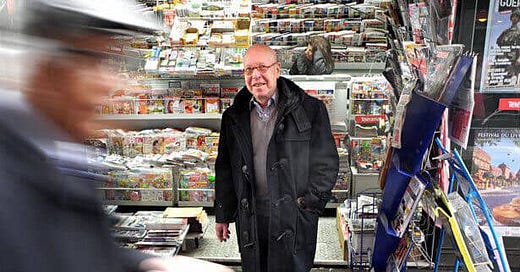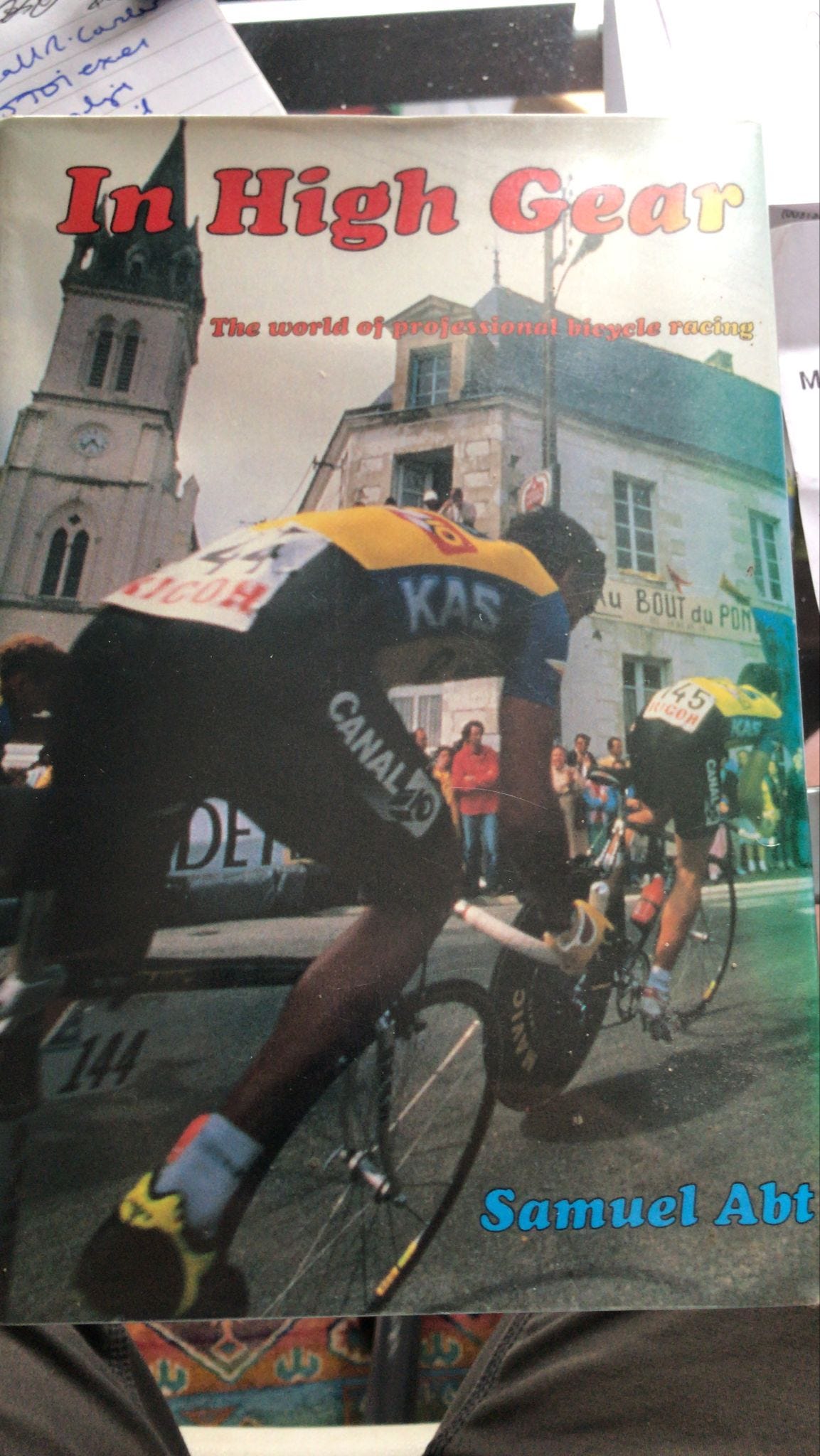Sam Abt - an appreciation
William Fotheringham writes a personal tribute to the late American journalist
Hi Subscribers,
I never had the pleasure of meeting the late Sam Abt, but all his colleagues in the press room spoke warmly and fondly about his writing and qualities as a person.
William Fotheringham, another distinguished member of the cycling press, has kindly written this article about Abt, his career, and the impact he had on the sport for an American audience.
I hope you enjoy the piece and come to know a small part of a man who made a mark on our sport and will be greatly missed.
Daniel 🫶
Sam Abt, who has died aged 91, played a defining role in introducing the Tour de France to an American audience for over 30 years, chronicling the breakthrough years of Greg LeMond and Lance Armstrong in the Tour de France for the International Herald Tribune and the New York Times.
Personally, I was fortunate to share accomodation with Sam in my first few outings at the Tour – no great coincidence just the same booking agency – by which time he was sharing a car with two other legends of the English-speaking press, the late Geoffrey Nicholson, who brought the Tour to British audiences for half a century, and Stephen Bierley of the Guardian. With the laconic ex-Tour man Graham Jones in the driving seat, the quartet was an intellectual force to be reckoned with, and dinners with them – a lengthy process in which the day’s stage was digested with the rare steak – gave you a real sense of being at a university high table.
Looking back, two things stand out for me about Sam as well as his gravelly Queen’s accent: his affectionate irascibility about the inconveniences of life on the Tour as a microcosm of life in France – be it a gendarme who wouldn’t recognise the power of the all-areas green press pass or a hotel restaurant that closed just as half a dozen hungry hacks rocked up desperate for food – and his curiosity.
Like all great journalists, Sam had a constantly inquiring mind, and one of Sam’s many questions came to define an era at the Tour. Mulling over the first of Miguel Indurain’s Tours during dinner one evening, Sam asked what the Anglo-Saxon equivalent for “Miguelon” was, the nickname that the Spanish press gave to the hulk from Navarre who would win the Tour five times, rarely breaking sweat and even more rarely showing stress. We gave it some thought, and the Spanish speaker among us came up with “Big Mig.” The nickname stuck.
To coincide with the Tour de France, I’m running a 20% discount on all new annual subscriptions, so for around £1/€1/$1 per week, you get all my transfer stories, interviews and race analysis. To take advantage of the special offer, simply click below.
Follow me on: Twitter — Instagram — Bluesky
By the time I arrived on the Tour in 1990, Sam had been there since 1977, and the hard yards he’d put in for the Trib’, plus the fact that cycling was smaller and more intimate, meant that he seemed to enjoy a virtual hotline to LeMond and the American team 7-Eleven. What I didn’t realise until much later was that this was because they had probably all learned about cycling in part through Sam, and that he was as much part of the cycling landscape for them as Belgian cobbles or Breton Badgers. In that sense, his role was similar to the one that JB Wadley had played for pioneering British cyclists in the 1950s and 1960s.
Again, hindsight is a wonderful thing. I knew Sam had been around the Tour and France for years, that much was obvious; the details, and others, eluded me. Sam had joined The New York Times in 1968, after putting in time on papers like the Baltimore Sun and the Worcester Telegram, and in 1971, he was one of the reporters selected by The Times to work on the vast array of classified documents that became known as the Pentagon Papers. He was one of 22 Times personnel who were sued by the US Justice Department to prevent publication of the Papers, an order that was over-ruled by the Supreme Court in what is now seen as a key defence of the rights of a free press against government restraint.
After that, it must have seemed like a holiday dealing with the vagaries of French gendarmes and restaurants and the Franco-centric press department at the Tour de France. In his later years, Sam actually used his holidays from the paper to cover the race as a freelancer for them, his day job being the actual serious stuff that made the paper happen, his various roles being listed in his New York Times obituary as “including sports editor, features editor, deputy editor and day editor.” This background in serious professional journalism shone through in his cycling work: the facts mattered, and getting the facts right mattered.
As well as the elegantly honed dispatches, there were the books, which probably offer the best account of LeMond’s rise to celebrity, and some of the best insights into life at both ends of the professional cycling spectrum in the 1980s. To take one example, In High Gear is a beautifully crafted account of life on the professional circuit, beginning with a delightful description of “the handful of cheery old men” who turn up at every race and “try to be useful”, so that they can experience pro-cycling on the inside.
“To the outsider,” Sam wrote, “one bicycle race is like another: a bunch of men pushing pedals… the sameness is stultifying… The trick is to put the sport into a context, to know not necessarily the riders but their stories… to understand that this is a personal world inviting all fans to enter. A seemingly meaningless victory or defeat may have a history all of its own. If the spectator doesn’t know that history, he is nothing more than the objective television camera. Worse – he misses the fun.” There are few better descriptions of why we love cycling, and how we love it.
Time to leaf through that book again.
Join The WhatsApp Community Group
I have established a WhatsApp Community Group for Substack founding members. I post interview recordings and transfer news almost daily.
To sign up, subscribe or upgrade to Founding Member status. Once you’ve signed up, I’ll ask for your mobile number and add you to the group. This group is not for mainstream cycling press or full-time staff on cycling teams.
You can modify your subscription by going to your profile settings. If you’re starting from scratch, click below.









Bill, I am a charter member of the Sam Abt Fan Club. And your remembrance is both heartwarming and outstanding. I was the IHT stringer in the south of France from the early 1970s until 1982, during a good portion of which Sam was my rabbi at the paper. I wrote hundreds of those back page features - in between Buchwald and the people column - and every time I got into trouble with one or two of the senior editors (one in particular, an idiot refugee from the Washpost who didn't know his colon from a colon) Sam was right there to defend my case and keep me from the firing squad. Sam was not just a terrific newspaper guy, someone with ink in his blood, but he was also a terrific friend. It's true that his legacy will always be having "discovered" the TdF, much like Columbus and the Caymans. But for those of us who wrote for, and dearly loved the IHT, he will always be one of those very important journalists who made the paper - and writing for it - the best there was. He made a difference.